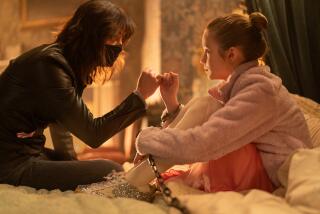True-life material proves irresistible at Telluride
Truth can certainly be stranger than fiction. If you look toward the Telluride Film Festival, it might also be stronger.
While the rest of Hollywood turns to far-fetched fantasies of flying superheroes, impossible romances and talking toys, the filmmakers behind the standout movies at the Colorado festival are finding that some of the year’s most powerful stories can be found in real-life events.
While that’s obviously the case with Telluride’s esteemed documentaries, three of the most enthusiastically received dramatic features at the just-concluded festival — the world premieres “The King’s Speech,” “127 Hours” and “The First Grader” — are based on the extraordinary accomplishments of actual people. A number of the festival’s other prominent new features, including “The Way Back,” “Of Gods and Men,” “Carlos” and “Incendies,” also have historical events undergirding their foundation.
The narrative allure of such stories is easy. When moviegoers see the words “Based on a true story” just as a film commences, they might grant a movie prospective empathy — the audience is more willing to welcome, both intellectually and emotionally, what it is about to see. That connection was a powerful wave pushing last year’s “The Blind Side.”
Yet any director or writer who strays too far from the factual path can be condemned for fast-and-loose filmmaking. “A Beautiful Mind” was nearly derailed when its makers sanded off several rough patches in mathematician John Nash’s personal life, and “The Hurricane” was knocked out for its liberties with boxer Rubin Carter.
“I remember thinking after ‘3000 Degrees’ that I’ll never do another real-life story,” Danny Boyle, the director and co-writer of “127 Hours,” says of a proposed movie about a Massachusetts firefighting tragedy that fell apart on the eve of production over life-rights issues. “It’s just too complicated. You don’t have control over the material.”
Yet when that true-life material is irresistible, filmmakers can find a way to make a film that is both creatively inventive and factually honest.
The people at the center of “The King’s Speech,” “127 Hours” and “The First Grader” could barely be more disparate. The first film, directed by Tom Hooper (“The Damned United”), focuses on King George VI, the World War II monarch who struggled to overcome a crippling speech impediment. The new movie from Boyle, who premiered “Slumdog Millionaire” in Telluride two years ago, recounts the harrowing wilderness experience of Aron Ralston, who amputated his own hand and forearm when pinned by a falling boulder. And “The First Grader,” from director Justin Chadwick ( “The Other Boleyn Girl”), profiles an illiterate 84-year-old Kenyan villager who, after the government promised free education for all, hobbled into an elementary school and wouldn’t leave until he could learn to read.
As unalike (and, outside of Ralston, as potentially unfamiliar) as their stories might be, the characters share an against-all-odds quest that ultimately unites the cheering spectator with the journey. In a way, these are all versions of inspirational tales as recognizable as “Rocky,” “The Karate Kid” or even “The Bad News Bears.” Yet precisely because they are in large part true, “The King’s Speech,” “127 Hours” and “The First Grader” are more affecting.
“The main thing was that it was uplifting,” Chadwick says of his interest in telling the story of “The First Grader’s” Nganga Maruge, a tale that came to filmmakers’ attention in a Los Angeles Times article. “You have to make something that is relevant these days, and it was a really good story.”
Chadwick shot his film, which stars the African actor Oliver Litondo as Maruge and England’s Naomie Harris as his determined teacher, Jane Obinchu, in a remote Kenyan village with no electricity or running water and populated the cast with 200 local schoolchildren, most of whom had never seen a movie or TV show. While Chadwick and screenwriter Ann Peacock (“A Lesson Before Dying”) made several changes to the story (Obinchu in the movie is younger than in real life, there’s a radio announcer adding jokes and exposition), the movie endeavored to get geographic and historical details as accurate as possible.
The scars that Maruge bears on his back as a result of torture under Britain’s colonial rule are replicated in the film on Litondo’s body, and the songs the young students sing throughout the movie are their own creation. “The movie also celebrates the children, and the healing power of children, no matter what terrible things have happened in your life,” Chadwick says.
Boyle says that while it’s easy to look at Ralston’s story as an unimaginable demonstration of superhumanism, he believes that we are all capable of doing the same thing if the situation demanded it. So at many turns throughout “127 Hours,” he and screenwriter Simon Beaufoy (“Slumdog Millionaire”) excised scenes that created barriers between Ralston ( James Franco) and the audience, meanwhile adding sequences that connected the trapped hiker to the rest of the world, crowd scenes and memories of an old girlfriend designed to be a magnet helping pull him free. “It may not be factual,” Boyle says of some of the added sequences, “but it’s truthful.”
The film preserves verbatim some of what Ralston says into his video camera during the ordeal, including a disorderly farewell to his parents, because it gives “127 Hours” a verisimilitude that polished scripting might lack. “It’s so slightly awkwardly written — a proper dramatist would never write the speech that way,” Boyle says. “But it felt very natural to leave it like that.”
Were Boyle making a purely fictional film, moviegoers, critics and studio executives would likely dismiss as preposterous some of the small bits in “127 Hours,” particularly a scene where Ralston, once freed and ready to try to be rescued, stops to take a photograph of his severed hand. “If it were in a script, they would say, ‘It’s just obscene. Throw it out.’ But because it really happened, it allows you to do it. And you can see the audience thinking, It must be true.”
As a young English child with a terrible stammer, David Seidler would listen to radio broadcasts of King George VI, who also had an almost incapacitating speech impediment. The king’s World War II addresses reminded Seidler that if the monarch could overcome stuttering, so could he: The king was his elocutionary inspiration.
Seidler grew up to become a screenwriter, writing “Tucker: The Man and his Dream” and numerous television programs, but he never forgot what he heard over the wireless so many decades earlier. He eventually adapted the story of the king and his relationship with his unconventional speech therapist, Lionel Logue, into a play, and the play has now become the movie “The King’s Speech.”
Even though the movie directed by Hooper is about the royal family and unfolds around Buckingham Palace and Westminster Abbey, “The King’s Speech” follows common themes of friendship, perseverance and trust. Logue ( Geoffrey Rush) was a talented language pathologist (the film was shaped by a trove of his unpublished papers, records and diary entries), but his true gift was companionship. Like any good shrink or comrade, the therapist was able to reveal and manage some of the things — an oppressive childhood, chiefly — that twisted the king’s ( Colin Firth) tongue in knots.
“What I felt the film was really about was that he was saved by friendship,” Hooper says. “Yes, it’s about a man with a stammer. But we all face blocks to becoming our better selves.”
The film is stuffed with period detail — “I’m obsessive about historical accuracy,” says Hooper, who also directed the HBO miniseries “ John Adams.” One of the film’s most memorable lines comes not from biography, but from something Hooper’s father told the director. Educated in a heartless boarding school, the filmmaker’s dad suffered some of the same confidence-killing treatment as did King George VI.
So when Hooper told his father he was stuck on one scene, his father told him some of the best advice he ever heard was this: “You don’t need to be afraid of the things you were afraid of when you were 5.” It’s Logue’s line to the king now, and it’s part of what makes “The King’s Speech” feel so real.
john.horn@latimes.com
More to Read
Only good movies
Get the Indie Focus newsletter, Mark Olsen's weekly guide to the world of cinema.
You may occasionally receive promotional content from the Los Angeles Times.







